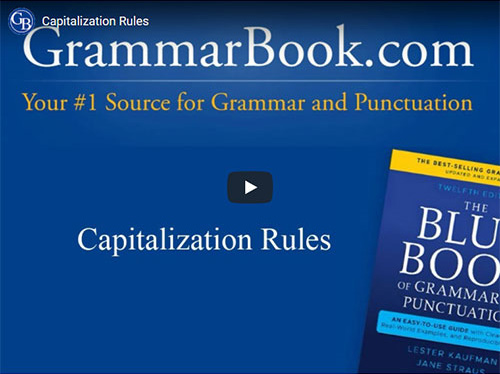|
Having trouble viewing this message? Click here to view it online.
To unsubscribe or change contact details, scroll to the bottom and follow the link.
|



|
|
Cumulative Sentence: Definition and Examples
|
|
Writers focused on pacing, mechanics, and style have many tools at their disposal in English. One such technique is the placement of a main clause at the beginning or end of a sentence.
Placing a main (independent) clause at the end of a sentence creates what is referred to grammatically as a periodic sentence.
Examples
Because I am not prepared, let's hold the meeting tomorrow instead.
Much to the surprise of his employees, Allen grabbed gloves and a shovel and joined them in the field. |
To reach the central thought, you have to read all the way to the end (the period). By delaying the most important information, each periodic sentence gives it extra gravity, often resulting in greater emphasis, suspense, or surprise.
Conversely, cumulative sentences—also referred to as loose sentences—place the central clause at the start of the sentence and follow it with information for additional insight, imagery, and clarity. The information might be in the form of words, phrases, or dependent clauses.
Examples
Let's hold the meeting tomorrow instead, because I am not prepared.
Allen grabbed gloves and a shovel and joined his employees in the field, much to their surprise. |
What a Cumulative Sentence Achieves
Because they lead with the independent clause, cumulative sentences provide greater movement for readers. They are typically more direct than periodic sentences, allowing readers to scan and absorb what is written more quickly.
The information at the end of a cumulative sentence elaborates on the main clause, but it is not essential to the central thought. While their insight into the primary thought might be diminished, readers could skip the modifying details and still maintain understanding.
Cumulative sentences serve communication when the aim is to be simple and clear as opposed to stylistic and potentially suspenseful. Cumulative sentences are common in writing that is declarative, straightforward, and conversational.
Examples
Elijah and Hannah strolled along the beach, holding hands, unaware of the surprise celebration awaiting them at the hotel.
Nadia aimed her camera and continued capturing pictures, stunned at the scene that was unfolding.
You should be able interpret Bill's mood simply by the way that he's standing.
Alexandor completed his doctorate in aerospace engineering after years of pursuing his dream while working two jobs. |
You can see how the modifying elements add further context, but if you scanned or overlooked them you would still have the crux of each sentence.
As a matter of comparison, let's look at the same statements written as periodic sentences:
Holding hands, unaware of the surprise celebration awaiting them at the hotel, Elijah and Hannah strolled along the beach.
Stunned at the scene that was unfolding, Nadia aimed her camera and continued capturing pictures.
Simply by the way that Bill's standing, you should be able interpret his mood.
After years of pursuing his dream while working two jobs, Alexandor completed his doctorate in aerospace engineering. |
In the periodic sentences, you have to read all of each one to gain what is being expressed. You'll also notice how the periodic sentences include nuanced suspense by withholding the main thought until the end.
Cumulative Sentences for Explaining
Because they lead with the main thought and then support it, cumulative sentences are often useful for explanations. Compare the following pairs as they might be written to instruct.
Cumulative: Turn the key to open the battery chamber.
Periodic: To open the battery chamber, turn the key.
Cumulative: Secure the four legs into the tabletop before setting the table upright.
Periodic: Before setting the table upright, secure the four legs into the tabletop.
Cumulative: You will know you prepared the solution correctly if it turns light blue.
Periodic: If the solution turns bright blue, you will know you prepared it correctly. |
The differences in the pairs might be subtle, but leading with the main information sets a stronger foundation for what is being explained as well as the descriptions that follow. The main clause—not the supporting details—is the basis of our understanding. This can be even more relevant when we are speaking.
More Examples of Cumulative Sentences
As we've mentioned, the main clause in cumulative sentences can be modified by words, phrases, or dependent clauses. Let's look at a few more examples:
I will do the dishes if you sweep the floor. (dependent clause)
Rodrigo will be promoted after years of excellent service. (prepositional phrase)
Amanda perseveres, focused, determined, and patient. (adjectives) |
The context in which you are writing will help determine whether cumulative sentences or periodic ones will be well placed for your audience. For example, fiction and long-form journalism will often offer more room for periodic sentences. On the other hand, user manuals and consumer blogs will typically serve readers better with a greater ratio of cumulative sentences to periodic ones.
In any event, as we continue to sharpen our skills, rather than rely on or overuse sentence types, we will apply nimble variation to keep our readers informed and inspired by what our writing conveys.
Related Topics
Complex Sentences: What Is a Complex Sentence?
|
View and comment on this
article on our website.
|
|
|

|
Pop Quiz
Identify whether each following sentence is cumulative or periodic. If periodic, change it to a cumulative sentence.
1. That pen will write better when you take the cap off.
2. If you forget the guitar, Keith will not be able to perform at the gig.
3. Obi-Wan's presence will stay, now with the spirits though he might be.
4. Karina emailed the memo, unaware of its destiny in recipients' spam folders.
5. Still cheerful, gloriously unaffected, Haruki painted in the rain.
|
 |
The Blue Book of Grammar and Punctuation
by Lester Kaufman and Jane Straus |
The Authority on English Grammar! Twelfth Edition Now Available
An indispensable tool for busy professionals, teachers, students, homeschool families, editors, writers, and proofreaders.
Available in print AND as an e-Book! Over 2,000 copies are purchased every month!
To order the book, simply click the link to order the book from the GrammarBook.com website.
|
Free BONUS Quiz for You!
Friend, because you are a subscriber to the newsletter, you get access to one of the Subscribers-Only Quizzes. Click here to take a Who vs. Which vs. That Quiz and get your scores and explanations instantly!
We will be adding many more quizzes this year to our already substantial list of them. If you have suggestions for topics we have not yet covered, please send us a message at help@grammarbook.com.
|
Hundreds of Additional Quizzes
at Your Fingertips
Subscribe now to receive hundreds of additional English usage quizzes not found anywhere else!
Teachers and Employers
Save hours of valuable time! You may assign quizzes to your students and employees and have their scores tallied, organized, and reported to you! Let GrammarBook.com take the hassle out of teaching English!
"Fun to test my skills."
"The explanations really help ... thanks!"
"I can select the quizzes to assign to my students, and then the results are reported to me automatically!"
If you think you have found an error in a quiz, please email us at help@grammarbook.com
|
Wordplay

Pop Quiz Answers
1. That pen will write better when you take the cap off. Cumulative
2. If you forget the guitar, Keith will not be able to perform at the gig. Periodic
Cumulative: Keith will not be able to perform at the gig if you forget the guitar.
3. Obi-Wan's presence will stay, now with the spirits though he might be. Cumulative
4. Karina emailed the memo, unaware of its destiny in recipients' spam folders. Cumulative
5. Still cheerful, gloriously unaffected, Haruki painted in the rain. Periodic
Cumulative: Haruki painted in the rain, still cheerful, gloriously unaffected.
|
 |
English in a Snap:
68 One-Minute English Usage Videos FREE |
Learn all about who and whom, affect and effect, subjects and verbs, adjectives and adverbs, commas, semicolons, quotation marks, and much more by just sitting back and enjoying these easy-to-follow lessons. Share them with your colleagues (and boss), children, teachers, and friends as well! Click here to watch.
|
|